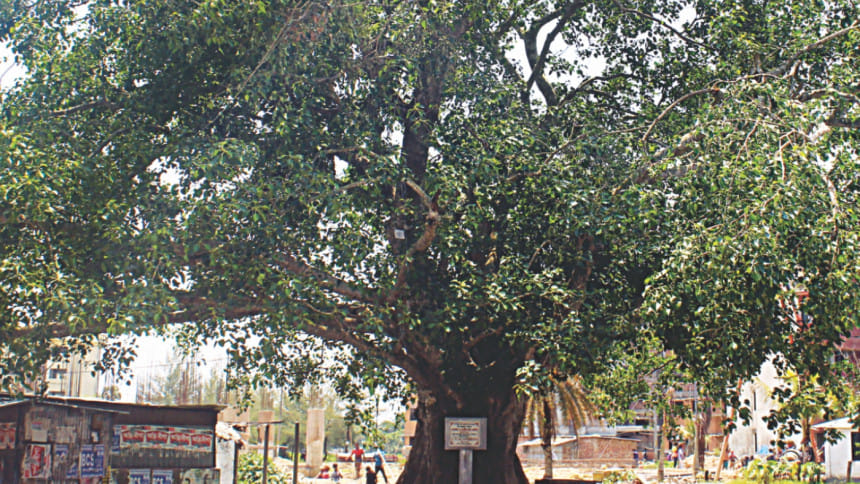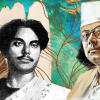Captivating during his stay in Mymensingh

As the light breeze blows, the leaves of the old banyan tree on the Jatiya Kabi Kazi Nazrul Islam University campus in Trishal of Mymensingh sway back and forth, as if it is dancing to the tune of music.
Almost 100 years ago, this tree, on weary afternoons, listened to the beautiful sad tunes of a flute played by a 14-year-old boy, who later grew up to be one of the greatest poet and writer in Bangla literature.
The boy was no other than National Poet Kazi Nazrul Islam, whose memories still live on in Trishal's scenic beauty and reside in the hearts of the locals.
According to Nazrul researcher Rashedul Anam, also assistant director of the Institute of Nazrul Studies at JKKNIU, Nazrul was brought to Kazir Shimla in Trishal in 1913 by Kazi Rafizullah, a Muslim police sub-inspector.
The policeman had met him at Nazrul's birth place in West Bengal's Burdwan, where the poet was born on May 25, 1899, in Churulia village.
Nazrul went to Darirampur High School (now Nazrul Academy) and was in class-VI. The then headmaster of the school was Bipin Chandra Chakraborty, said Anam who wrote about Nazrul's one-year stay at Trishal in his book “Nazrul Jiboner Trishal Addhya”.
Since his school was six miles away from Kazir Shimla and had almost no proper road communication, Nazrul moved his lodging to Bechutia Bepari's house at Namapara, which was near his school.
"He would often spend his days playing the flute, sitting under the banyan tree at Namapara, on his way to school," said Anam.
During his short stay at Trishal, Nazrul became known among the locals for his "Punthi" (a kind of folk literature) reading skills and his mesmerising flute tunes.
Referring to his findings, Anam mentioned Nazrul's English teacher at the school, Mohim Chandra Khasnabish, who had described the poet as a "quiet and absent-minded" boy.
Yet, the young Nazrul had charmed the audience and earned prizes at the annual cultural function of the school reciting two poems of Rabindranath Tagore -- “Dui Bigha Jomi” and “Puratan Bhrittya” -- without any preparation whatsoever.
After his annual examination, Nazrul told Bepari's daughter-in-law Saforjaan Banu about his plan to go back to West Bengal. The kind-hearted woman gave him some money so that he could.
Before his departure, Nazrul left a letter for his headmaster. After receiving the letter, the emotion-gripped headmaster read it out before the students and teachers of the school and asked all his students to find Nazrul but they failed to do so.
"The letter could not be not found as it was not preserved," said Anam.
Nazrul is still remembered by Kazi Rafizullah's descendants. “We feel very proud as Nazrul first came to Bangladesh, to our Kazir Shimla,” said Durdana Khanam, daughter-in-law of Kazi Rafizullah.
"The presence of Nazrul for a few months glorified and gave us a historic status," said a smiling Durdana. She urged the government to protect Kazi Rafizullah's ancestral homestead, to preserve Nazrul's memories.
On March 1, 2005, the government established JKKNIU at Namapara, Trishal as the only public university named after the poet and writer.
"The university, currently with 4,000 students, has a special focus on liberal-slash-performing arts, education and research," said Prof Mohit Ul Alam, vice-chancellor of JKKNIU.
Perhaps someday, the old banyan tree would again witness the rise of yet another poet who would reign the Bangalee spirit and thoughts for generations, just like Kazi Nazrul Islam.

 For all latest news, follow The Daily Star's Google News channel.
For all latest news, follow The Daily Star's Google News channel. 








Comments